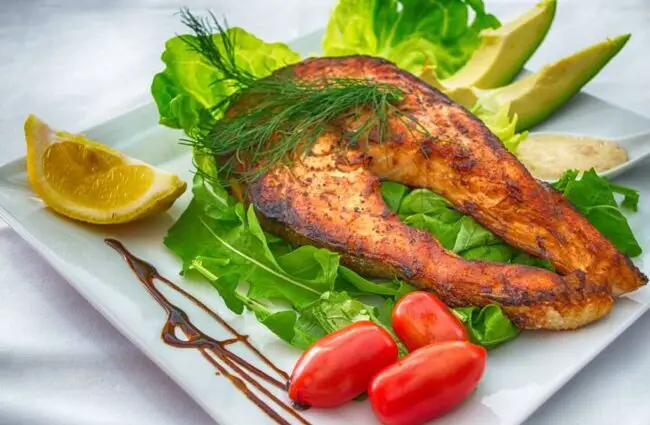Nutritional Benefits of Eating Pollock

Are you looking for a nutritious and delicious addition to your diet? Look no further than Pollock! This superfood is packed with essential vitamins and minerals, low in calories and fat, and a sustainable seafood choice. In this blog post, I’ll explore the top 5 nutritional benefits of eating pollock, from improved heart health and cognitive function to weight management and healthy skin and hair. Plus, I’ll provide tips and delicious recipes for incorporating pollock into your balanced diet. Let’s dive in!
Why Pollock is a Superfood for Health and Nutrition
Pollock is a white fish that is low in calories and fat but packed with essential nutrients that promote overall health and nutrition. Here are some reasons why Pollock should be part of your diet:
Lean Protein: Pollock is an excellent source of lean protein that can help build and repair tissue, as well as support immune function.
Vitamins and Minerals: Pollock is rich in essential nutrients like vitamin B12, phosphorus, and selenium, all of which play important roles in maintaining healthy bones, teeth, and organs.
Weight Management: Pollock is low in calories and fat, making it a smart choice for those who are watching their weight.
Sustainable: Pollock is a sustainable seafood choice that helps support the health of our oceans. Incorporating Pollock into your diet is an easy way to boost your nutritional intake and support your overall health and well-being.
The Nutritional Benefits of Pollock: A Breakdown of Vitamins and Minerals
Pollock is a nutritional powerhouse that is rich in essential vitamins and minerals. Incorporating Pollock into your diet can provide numerous health benefits, such as:
Vitamin D: Pollock is a good source of vitamin D, which is important for maintaining strong bones and teeth.
Calcium: Pollock contains calcium, which is beneficial for bone health and muscle function.
Iron: Pollock is a good source of iron, which is necessary for blood production and oxygen transport in the body.
Vitamin B12: Pollock is one of the best dietary sources of vitamin B12, which is essential for nerve function and the production of red blood cells.
Phosphorus: Pollock contains phosphorus, which is important for bone and teeth health, as well as energy metabolism.
Selenium: Pollock is a good source of selenium, which has antioxidant properties and is essential for thyroid hormone metabolism.
In addition to these vitamins and minerals, Pollock also contains omega-3 fatty acids, which have numerous health benefits. These essential fatty acids can help reduce inflammation, regulate blood pressure, and promote healthy brain function. The nutritional profile of Pollock makes it a great addition to a balanced diet, and its versatility as an ingredient means that it can be enjoyed in a variety of dishes.
Pollock Fish Oil: The Essential Fatty Acids Explained
Pollock is not only a great source of lean protein, but it also contains essential fatty acids that are crucial for overall health and well-being. The omega-3 fatty acids found in Pollock oil have numerous health benefits:
Reducing inflammation: Omega-3s can help reduce inflammation in the body, which is linked to numerous health problems like arthritis, heart disease, and cancer.
Regulating blood pressure: Omega-3s can help regulate blood pressure, which is important for cardiovascular health.
Promoting healthy brain function: Omega-3s are essential for brain health and can improve cognitive function, memory, and focus.
Supporting healthy skin, hair, and nails: Omega-3s help keep skin hydrated, strengthen hair follicles, and improve nail health
Incorporating Pollock oil supplements into your diet can be an easy way to enjoy the benefits of omega-3s. Pollock oil supplements are available in various forms like capsules, liquid, and soft gels. It’s essential to choose a high-quality brand to ensure that you’re getting the full benefits of omega-3 fatty acids. Pollock oil supplements contain EPA (eicosapentaenoic acid) and DHA (docosahexaenoic acid), two types of omega-3s that are abundant in fatty fish. The American Heart Association recommends that adults consume at least two servings of fatty fish per week, or take omega-3 supplements if they are not able to meet their needs through diet alone. By incorporating Pollock oil into your diet, you can enjoy the benefits of essential fatty acids and support your overall health and well-being.
How Pollock Helps Improve Brain and Cognitive Function
Pollock offers numerous benefits for brain and cognitive health. The omega-3 fatty acids found in Pollock can improve brain function and cognitive performance. Studies have shown that omega-3s can enhance memory, focus, and overall brain health. Pollock is a natural source of choline, which is essential for brain development and function. Eating Pollock regularly can help support long-term brain health and cognitive function. In summary, consuming Pollock can help improve brain function and cognitive performance through its omega-3s and choline content.
Pollock’s Role in Supporting Heart Health
Pollock is a heart-healthy food that can help lower cholesterol and reduce the risk of heart disease. The omega-3 fatty acids in Pollock can improve blood flow and lower inflammation, which are both important for heart health. In addition to omega-3s, Pollock is a good source of B vitamins, which can support cardiovascular health and reduce the risk of heart attacks and strokes. The protein in Pollock can also help lower blood pressure and improve overall heart function. Incorporating Pollock into your diet can be an easy way to support your heart health and reduce your risk of heart disease. Try adding Pollock to a salad or making a healthy fish taco with grilled Pollock. There are countless ways to enjoy this heart-healthy superfood!
Eating Pollock for Improved Digestive Health
Pollock is not only a great source of protein and essential nutrients, but it can also help promote healthy digestion and prevent digestive problems. Here are some ways in which incorporating Pollock into your diet can improve your digestive health:
Fiber: Pollock is a good source of fiber, which can help promote regular bowel movements and prevent constipation.
Gut flora: The nutrients in Pollock can help promote the growth of healthy gut bacteria, which are essential for proper digestion and overall digestive health.
Low-fat: Pollock is a low-fat protein source that is easy to digest and can be helpful for people with digestive issues.
Healthy protein: The protein in Pollock can help support healthy muscle and improve metabolism, which can in turn promote healthy digestion.
Now that you know how Pollock can benefit your digestive health, consider incorporating it into your meals for added nutrition and digestive support.
Pollock is a Low-Calorie, High-Protein Food for Weight Management
If you’re looking for a low-calorie, high-protein food to help you manage your weight, Pollock is an excellent choice. Here’s why:
Protein: Pollock is a lean source of protein, with around 20 grams of protein per 100 grams of fish. Protein is important for building and repairing tissue, as well as for supporting a healthy metabolism.
Low in calories: Pollock is naturally low in calories, with only around 80 calories per 100 grams of fish. This makes it a great option for people who are trying to lose weight or maintain a healthy weight.
Satiety: The high protein content of Pollock can help you feel fuller for longer, reducing the likelihood of overeating or snacking between meals.
Improves metabolism: The nutrients in Pollock can help improve metabolism and support healthy body composition.
Here are a few simple ways to incorporate Pollock into your diet for weight management:
Grilled Pollock fillets with a side of roasted vegetables
Baked Pollock with a tasty marinade and a simple green salad
Pollock ceviche with avocado and lime
Pollock tacos with fresh salsa and a side of brown rice
Remember, keeping a balanced diet and exercising regularly are key to managing your weight and maintaining overall health.
Pollock’s Benefits for Sports Performance and Muscle Recovery
Pollock is a great food for athletes and fitness enthusiasts looking to improve their performance and muscle recovery. Here are some of the ways Pollock can benefit your sports endeavors:
1. Protein for Muscle Repair and Recovery
Pollock is a lean source of protein, with around 20 grams of protein per 3-ounce serving. This protein can help repair and rebuild muscle tissue after exercise, reducing soreness and aiding in recovery.
2. Nutrients for Improved Muscle Function and Endurance
Pollock is also rich in vitamins and minerals like vitamin B6, which can improve muscle function and endurance. These nutrients can help you go longer and harder during workouts and sports activities.
3. Low-Fat and Cholesterol-Free Protein
Unlike some other protein sources, Pollock is low in fat and cholesterol. This makes it a healthy protein option for athletes and fitness enthusiasts who need to watch their fat and cholesterol intake.
4. Versatile for Pre- and Post-Workout Meals
Pollock is a versatile ingredient that can be incorporated into pre-and post-workout meals. Try adding it to a salad or wrap for a high-protein, low-fat meal that will fuel your workouts and aid in recovery. Incorporating Pollock into your diet can be an easy way to support your sports performance and muscle recovery goals.
Pollock for Healthy Skin and Hair: The Beauty Benefits of This Fish
Pollock is not only beneficial for overall health and nutrition, but it can also work wonders for your skin and hair. Here are some of the beauty benefits of incorporating Pollock into your diet:
Reduced Inflammation
The omega-3 fatty acids in Pollock can help reduce inflammation in the body, which can lead to improved skin health. Inflammation can cause skin problems like acne, eczema, and rosacea, so incorporating Pollock into your diet can help reduce these issues.
Improved Skin Elasticity
Protein is essential for healthy hair and skin, and Pollock is a great source of lean protein. The protein in Pollock can help improve skin elasticity, which is important for a youthful appearance.
Healthy Hair Growth
The protein in Pollock can also support healthy hair growth. Hair is made up of protein, so consuming more protein-rich foods like Pollock can help improve the strength and health of your hair.
Preventing Hair Loss
The B vitamins in Pollock can help prevent hair loss and promote healthy hair growth. Vitamin B12, in particular, is important for healthy hair and skin, and Pollock is a rich source of this essential vitamin. So, if you’re looking for a natural way to improve the health of your skin and hair, look no further than Pollock.
Incorporating Pollock into a Balanced Diet: Tips and Delicious Recipes
Pollock is a versatile ingredient that can be used in a variety of dishes to add nutrition and delicious flavor. Here are some tips and recipes for incorporating Pollock into a balanced diet:
Pollock Tacos
1 lb Pollock fillets
1 tsp chili powder
1/2 tsp cumin
1/4 tsp salt
1/4 tsp black pepper
2 tbsp olive oil
8 corn tortillas
2 cups shredded cabbage
1 avocado, diced
1/4 cup sour cream
Lime wedges, for serving
Preheat oven to 400F degrees.
In a small bowl, combine chili powder, cumin, salt, and black pepper. Rub the spice mixture over the Pollock fillets.
Heat oil in an oven-safe skillet over medium-high heat. Add the Pollock and sear for 2-3 minutes on each side.
Transfer the skillet to the oven and bake for 5-8 minutes until the Pollock is cooked through.
Heat tortillas in a dry skillet until warmed through.
Place shredded cabbage on tortillas, then top with Pollock, avocado, and sour cream.
Serve with lime wedges.
Pollock and Vegetable Stir Fry
1 lb Pollock fillets
2 tbsp soy sauce
1 tbsp cornstarch
1 tsp grated ginger
2 cloves garlic, minced
1 red bell pepper, sliced
1 zucchini, sliced
1 cup snow peas
2 tbsp vegetable oil
Cooked rice, for serving
Cut the Pollock into bite-sized pieces.
In a small bowl, whisk together soy sauce, cornstarch, ginger, and garlic. Add Pollock and toss to coat.
Heat oil in a wok or large skillet over high heat. Add the Pollock and stir fry for 2-3 minutes until lightly browned.
Add the vegetables and stir fry for 3-4 minutes until crisp-tender.
Serve over cooked rice.
Pollock Salad
1 lb Pollock fillets
1 tbsp olive oil
Salt and pepper, to taste
4 cups mixed greens
1/2 cup cherry tomatoes, halved
1/2 cup cucumber, sliced
1/4 cup red onion, sliced
2 tbsp balsamic vinegar
1 tbsp honey
2 tbsp olive oil
Preheat oven to 400F degrees.
Place Pollock fillets on a baking sheet and drizzle with 1 tbsp olive oil. Season with salt and pepper.
Bake for 10-12 minutes or until cooked through.
In a large bowl, combine mixed greens, cherry tomatoes, cucumber, and red onion.
In a small bowl, whisk together balsamic vinegar, honey, and 2 tbsp olive oil.
Divide the salad among plates, top with Pollock fillets, and drizzle with dressing.
These are just a few examples of the many delicious ways you can incorporate Pollock into your meals. Have fun experimenting with different recipes and enjoy the nutritional benefits of this superfood!
Conclusion
In conclusion, Pollock is a superfood that offers numerous health and nutritional benefits. Whether you’re looking to support heart health, improve brain function, promote digestion, or manage your weight, incorporating Pollock into your diet is an easy way to achieve your goals. With its rich profile of vitamins, minerals, and omega-3 fatty acids, Pollock is a versatile ingredient that can be enjoyed in a variety of dishes. Plus, as a sustainable seafood choice, consuming Pollock can also help support the health of our oceans. So why not give this delicious and nutritious fish a try? Your body (and the planet) will thank you. Thank you for reading today’s post.








